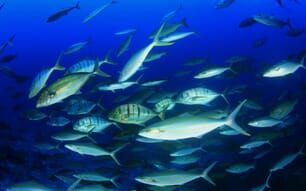The Council agreement strikes a balance between the commitment to sustainable and transparent fishing activities outside Union waters, and the need for robust administrative procedures, especially concerning authorisations.
"The Council text increases the transparency of external fishing activities and will make it more difficult to circumvent the CFP rules, while limiting administrative burdens," said Martijn van Dam, Dutch minister for agriculture and President of the Council.
The Commission proposal for a regulation on external fishing fleets envisages an overhaul of the regime of authorisations for Union fishing vessels to fish outside Union waters, and for third country fishing vessels to fish inside Union waters.
The main objective is to make sure that the core principles of the Common Fisheries Policy, such as sustainability or the fight against illegal fishing, are respected by EU vessels whether they fish inside or outside EU waters. In order to do so the proposed regulation lays down clear and precise rules to authorise and monitor all EU vessels when they fish outside the EU waters, irrespective of where the fishing activity takes place.
Simpler and wider-ranging rules
The Council general approach confirms the ambitious broadening of the scope of the regulation to issues such as direct third country licences, chartering and "reflagging". It also endorses the Commission approach as to introducing a joint database to further improve the transparency of external fishing activity and to simplify monitoring.
Streamlined authorisation procedures
Before it can fish outside Union waters, an EU vessel needs an authorisation by or an agreement with the third country or international fisheries management organisation concerned. Furthermore an EU vessel now needs an authorisation by its flag Member State too.
The Council general approach introduces changes to the various authorisation procedures to limit the administrative burden, increase legal certainty, ensure equal treatment between internal and external fleets, and shorten the time of response to applicants.
Improved reporting obligations
Reporting obligations are reviewed by the Council in order to make them supplementary to existing channels and practices under fisheries agreements.
The proposed regulation on external fishing fleets supplements the regulations on controls and on illegal, unreported and unregulated fishing (IUU), which are key implementing pillars of the CFP.
The Commission sent its proposal in December 2015 and the Council examination started in January 2016 at working party level.
Commenting on the announcement, Oceana said it is disappointed that EU fisheries ministers removed the option that would give the the European Commission the power to withdraw authorisations when a Member States fails to monitor their fleet correctly.
Ministers also rejected the requirement put forward that only vessels with a clean compliance record can apply for a fishing licence to fish in non-EU waters, thereby allowing vessels that previously committed a serious infringement access to non-EU fishing grounds.
However, Oceana said it does welcome the new commitment to increasing transparency in EU vessels in non-EU waters by creating a first-ever public database and also preventing abusive “flag hopping” or “reflagging”, where an EU vessel exits the EU fishing fleet and reflags to a non-EU country, in order to continue fishing after exhausting the EU quota or to circumvent conservation and management measures or applicable laws.
“Transparency in fisheries is an essential tool to prevent illegal fishing, avoid obscurity in private deals with third countries and ensure sustainability for fisheries resources. Oceana is fully behind the idea to create a public database of vessels fishing worldwide. This is a step in the right direction by EU fisheries ministers to enhance transparency for European businesses,” said Maria Jose Cornax, Fisheries Director of Oceana in Europe.


